Meet Our Available Puppies
Find the perfect ‘tail’ for your story!
The Puppy You've
Been Waiting For.
Product Title Here
Put a bird on it tumblr trust fund sustainable williamsburg green juice.
Product Title Here
Put a bird on it tumblr trust fund sustainable williamsburg green juice.
Product Title Here
Put a bird on it tumblr trust fund sustainable williamsburg green juice.
Product Title Here
Put a bird on it tumblr trust fund sustainable williamsburg green juice.
Product Title Here
Put a bird on it tumblr trust fund sustainable williamsburg green juice.
Product Title Here
Put a bird on it tumblr trust fund sustainable williamsburg green juice.
March 26, 2025

Newborn puppies go through incredible neurological changes during their first eight weeks of life. These puppy growth stages are crucial for brain development, learning capacity, and future temperament. Understanding each phase helps breeders, trainers, and new owners provide the best care for their puppies. You can see our available puppies here https://storytaildogs.com/puppies-available
Puppy Growth Stages One: Neonatal Period (0-2 Weeks)
During the neonatal period, puppies are entirely dependent on their mother. Their eyes and ears remain closed, limiting sensory input to touch, taste, and smell. They rely on their mother’s warmth and guidance for feeding and survival. Neurologically, the brain is still developing, and early reflexes like rooting and suckling dominate their behavior.
One of the most critical influences at this stage is Early Neurological Stimulation (ENS). Breeders who implement ENS exercises—such as holding a puppy in different positions, tickling their paws, and exposing them to mild stressors—help improve their cardiovascular health, stress responses, and overall resilience. These exercises take only a few seconds each day but have lasting effects on the puppy’s adaptability.
ENS benefits include stronger heart rates, more efficient adrenal glands, and greater stress tolerance. Puppies exposed to ENS often show increased confidence and problem-solving abilities as they grow. The mild stress from these exercises helps condition their nervous system, preparing them for future challenges.
Besides ENS, gentle handling encourages early trust in humans. Regular contact helps puppies feel secure and comfortable with human touch. Keeping them warm is essential, as their ability to regulate body temperature is still developing. They rely on their mother and littermates for warmth, but breeders can use heating pads or blankets if needed.
Although movement is limited, puppies still exercise their muscles by squirming and stretching. This early activity supports motor development. Nursing strengthens their jaw muscles, and rooting reflexes ensure they find their mother’s milk. Proper nutrition at this stage is critical for brain development and overall health.
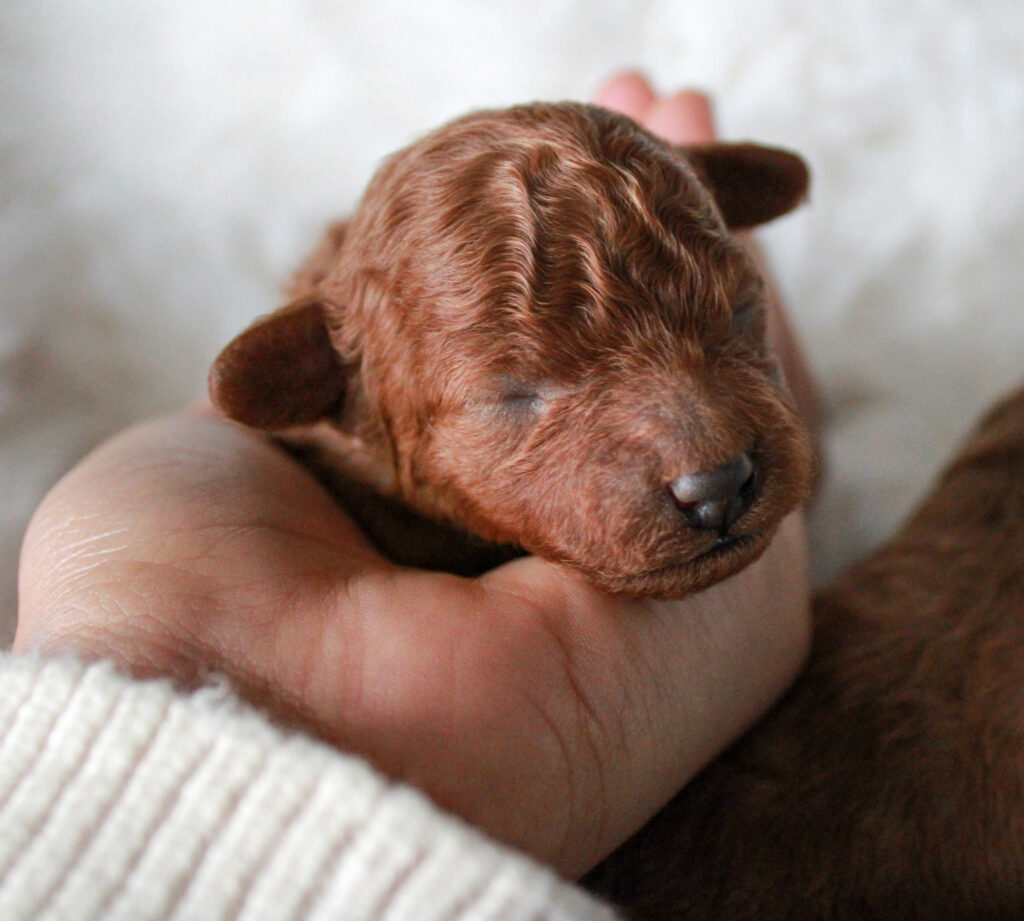
Our Gentle Start: Building Trust from Day One
During the first two weeks, we try to focus making the puppies feel safe and comfortable in their environment. This period of time is very sensitive, and we try to keep the stress level low for the mom and her puppies. Days 1-2 we do not interact much with the puppies, but allow them to adjust to their new life. We do a neonatal check everyday during this period, which includes a head-to-toe review of each puppy and a daily weight check. We weigh the puppies for the first 14 days, to make sure they are healthy and growing. On day three, we start Early Neurological Stimulation (ENS) and Early Scent Introduction (ESI).
What is ENS?
ENS in the early weeks consists of 5 exercises that are performed for 3-5 seconds. The benefits of these exercises include an improved heart rate, stronger heart beats, stronger adrenal glands, more tolerance to stress, and greater resistance to disease.
- Tactical Simulation (between toes)
- Head held erect
- Head pointed down
- Supine Position
- Thermal stimulation
What is ESI?
ESI is exposure to different pungent scents each day. This exercise gives our puppies nose awareness and confidence, It is great for hunting, tracking, and diabetic alert dogs, as well as many other things. Some of the scents we expose them to include garlic, rosemary, red pepper, ginger, cinnamon, and oregano. We hold them close to us and let them smell the item. They then have different reactions.
Positive: Puppy actively engages with the scent.
Neutral: No reaction noted
Negative: Puppy moves away from the scent.
During days 4-14, we gently handle our puppies by running our fingers along their body, offering them our nose and mouth to smell. We hold them close to our heart and face until they become calm, and then return then to their mother.
Puppy Growth Stages Two: Transitional Period (2-4 Weeks)
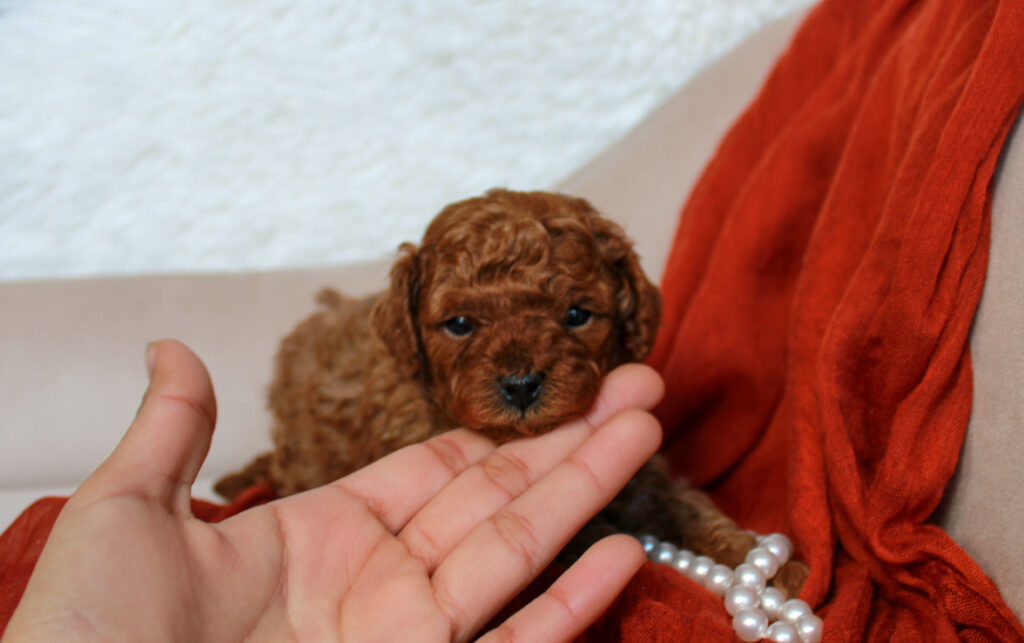
At around two weeks, puppies begin a rapid transformation. Their eyes open, though vision remains blurry at first. Hearing develops next, allowing them to start responding to sounds. They begin standing, taking their first wobbly steps, and interacting with littermates.
Neurologically, puppies start processing new stimuli. They recognize their mother, learn familiar scents, and show early signs of curiosity. Their ability to control body temperature improves, making them slightly less dependent on external warmth. This is a crucial time to introduce new textures, soft toys, and gentle human interaction.
During this phase, puppies begin wagging their tails and showing basic social behaviors. They attempt to groom themselves and nibble on their siblings. These early interactions shape how they communicate later in life. Exposure to a variety of gentle experiences helps strengthen their neurological pathways.

Introducing the World, One Pawstep at a Time
Once our puppies are three weeks old, we start more exposure activities. We add a designated potty area, and start giving a new novelty item each day. These items allow puppies to become exposed to normal objects. The goal of these activities is to build trust, and we ensure that this is a fun activity, where they can be curios and engage as they please. Some novelty items include: a pillow, a bucket, different kinds of fruit, a pumpkin, a piece of wood, a rolled up towel, fake plants, stuffed animals, a jar, a soccer ball, a stool, a boot, a helmet, and different kinds of fabric (silk, cotton, fleece, velvet, etc.)
During this time, we also start our noise exposure and gentle handing exercises. The handling exercises include the 10-step puppy handing exercise, which we do very gently to start.
Puppy 10-Step Handling Exercise
- Rub and tug on ears
- Cover eyes
- Open mouth and run fingers on gums
- Rub belly in circular motions
- Run hand down back and back up again then pat on back
- Tug and twist (circular motion) on tail
- Touch all paws and push in between pads
- Tap nails
- Run fingers around neck and tug on collar
- Touch their nose
Noise Exposure
Our noise exposure starts with a few very brief sessions of exposure (ex. banging on a metal bowl) As the puppies develop their senses, it is important to introduce them to a variety of sounds they might encounter in their forever homes. We introduce new types of music, TV shows and movies, “noise exposure” YouTube videos each day. Additionally, puppies are exposed to quiet background noises through the day. Once all puppies are toddling around, we add a shallow bowl of water to their space.
Puppy Growth Stages Three: Socialization Period (4-8 Weeks)

This stage is critical for mental and emotional development. Puppies become highly aware of their environment and form lasting impressions. Their brains develop rapidly, absorbing experiences that shape their future responses to the world.
- 4-5 Weeks: Puppies engage in more active play. Their coordination improves, and they become more vocal. They begin exploring beyond their whelping area.
During this puppy growth stages of development we start different exposure activities such as :
- Stuffed toys, ropes, rubber toys (no movement)
- Ping pong balls (gentle movement)
- Bubble wrap/ foil/ varied fabric
- Small blocks and rings
- Tactile boards – beginner
- Uneven/ Balance boards (tactile work)
- Free play (variety of items, texture, and sizes)
- Tunnel/ Box (in, around, over)
- Big balls (larger than they are)
- Big blocks (step and slide)
- 6 Weeks: The fear imprint period starts. Puppies may react cautiously to new experiences, making this an essential time for positive exposure. Gentle handling, new surfaces, and controlled socialization are vital.
During this puppy growth stages of development we start different exposure activities such as :
- Wiggle, Jiggle, Giggle (items that move—not all at once)
- Water bottles
- Ball pit (tennis balls or plastic colored balls)
- Things with wheels (skateboard, bike, cart etc.)
- Snuffle mats for tactile work
- Reflective footing
- 7-8 Weeks: Their brains become more advanced, and they develop problem-solving skills. Basic training, like name recognition and simple commands, can begin. Puppies also start understanding bite inhibition from interactions with their littermates.
- Activity cube
- Brain games (use kibble or treats)
- Water exposure (baby pool)
- Parachute/ balloons /plastic bags (overhead exposure)
- Educational path / Obstacle course
- Neutral dog
- Larger slide/ steps with landing
- Crate exposure
- Expeditions: car ride, explorer walk, etc.
- Puppy massage by “stranger”
- “Pass the puppy exercise with “strangers”
- Outside puppy playground exposure
In week seven, our puppies have their first vet visit and vaccinations. We also do their aptitude testing to match our puppies to the right home.
During this puppy growth stages, structured socialization is key. Exposure to different sights, sounds, and people fosters adaptability. Puppies who experience varied environments tend to grow into well-adjusted, confident dogs. Gentle challenges, like climbing over small obstacles, further enhance coordination and resilience.

The Power of ENS and ESI: How Story Tail Dogs Prepares Puppies for a Lifetime of Success
Early Neurological Stimulation (ENS) and Early Scent Introduction (ESI) are two scientifically backed methods that help puppies develop into confident, well-adjusted companions. At Story Tail Dogs, we use both techniques to give our puppies the strongest possible foundation for therapy, emotional support, and companion roles. By starting early, we ensure that each puppy has the tools to navigate new environments, handle stress, and form strong bonds with their future families.
What Are ENS and ESI?
The first few weeks of a puppy’s life are crucial for brain development, sensory adaptation, and emotional stability. ENS and ESI take advantage of this critical period by introducing controlled challenges that promote neurological growth and sensory awareness. These techniques are not new—they have been studied for decades and used in breeding programs for working, service, and military dogs.
Early Neurological Stimulation (ENS)
ENS consists of five specific handling exercises performed on puppies between days 3 and 16 of life. Each session lasts only a few seconds, but the benefits last a lifetime. The exercises include:
- Tactile Stimulation – Gently rubbing the puppy’s paws with a soft cotton swab.
- Head Up Position – Holding the puppy upright for three to five seconds.
- Head Down Position – Holding the puppy with its head facing downward.
- Supine Position – Placing the puppy on its back in a cradled position.
- Thermal Stimulation – Briefly placing the puppy on a cool, damp cloth.
These exercises expose puppies to mild stress in a safe and controlled way. The goal is not to overwhelm them but to stimulate their nervous systems and encourage resilience. Studies have shown that puppies who undergo ENS develop stronger cardiovascular systems, improved stress tolerance, and better problem-solving skills.
Between 4-8 weeks, we do 10 step puppy handling exercises:
10 Step Puppy Handling Exercise
- Rub and tug on ears
- Cover eyes
- Open mouth and run fingers on gums
- Rub belly in circular motions
- Run hand down back and back up again then pat on back
- Tug and twist (circular motion) on tail
- Touch all paws and push in between pads
- Tap nails
- Run fingers around neck and tug on collar
- Touch their nose
Early Neurological Stimulation (ENS) includes exposure to various sounds to help desensitize puppies and prevent fearfulness later in life. We introduce a range of noises, such as clapping, doorbells, vacuum cleaners, household appliances, car engines, and even traffic sounds. This helps puppies become accustomed to the sounds they will encounter in the world, reducing anxiety and making them more adaptable to different environments as they grow. The goal is to ensure that puppies are not startled or scared by common noises, which supports their overall confidence and emotional resilience.
ENS also helps puppies become more adaptable. Many dogs experience stress when encountering new situations, but those exposed to ENS tend to adjust more easily. Whether visiting the vet, meeting new people, or exploring a new environment, these puppies handle change with confidence rather than fear.
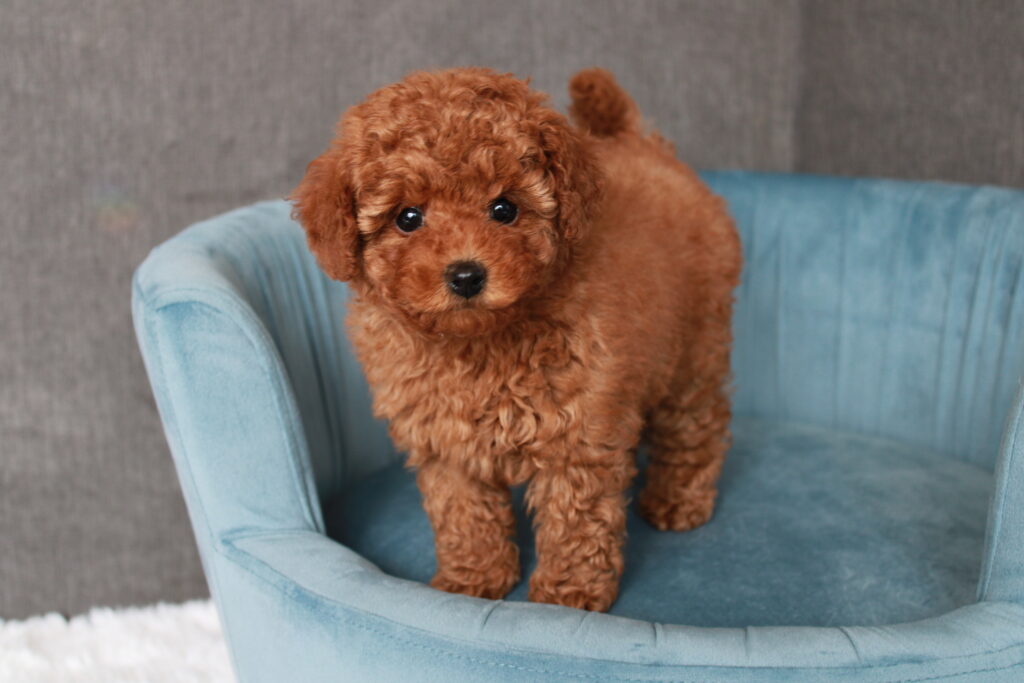
Long-Term Impact of Early Neurological Development
Puppies raised with thoughtful neurological stimulation tend to be more resilient, confident, and trainable. Those exposed to ENS and early enrichment often excel in therapy work, service roles, and family life. A well-developed nervous system ensures they handle stress better and adapt more easily to new environments.
By understanding the neurological puppy growth stages of puppy development, breeders and owners can create a foundation for well-adjusted, emotionally stable dogs. Early experiences shape a puppy’s future, making these first eight weeks some of the most critical in a dog’s life.
Early Scent Introduction (ESI)
ESI is another powerful tool for early development. While ENS focuses on neurological stimulation, ESI enhances a puppy’s ability to process scents. Since a dog’s sense of smell is one of its most vital tools, strengthening this skill at an early age provides lasting benefits.
ESI involves introducing puppies to a new scent each day between days 3 and 16. The scents range from natural elements like grass, flowers, and wood to household items such as leather or spices. The breeder places the scent near the puppy’s nose for a few seconds, allowing them to investigate and process the new smell.
The goal of ESI is to create a positive association with novel scents. Puppies exposed to a variety of smells early in life tend to be more curious and confident when encountering new environments. For therapy and emotional support dogs, this is especially important. These dogs need to remain calm and focused in a variety of settings, from hospitals and classrooms to airports and busy public spaces.
By strengthening a puppy’s scent recognition abilities, ESI also lays the groundwork for future training. Many therapy and support dogs rely on scent cues to perform their jobs effectively. Whether detecting emotional distress, responding to changes in human behavior, or simply navigating their surroundings, a well-developed sense of smell plays a crucial role in their success.
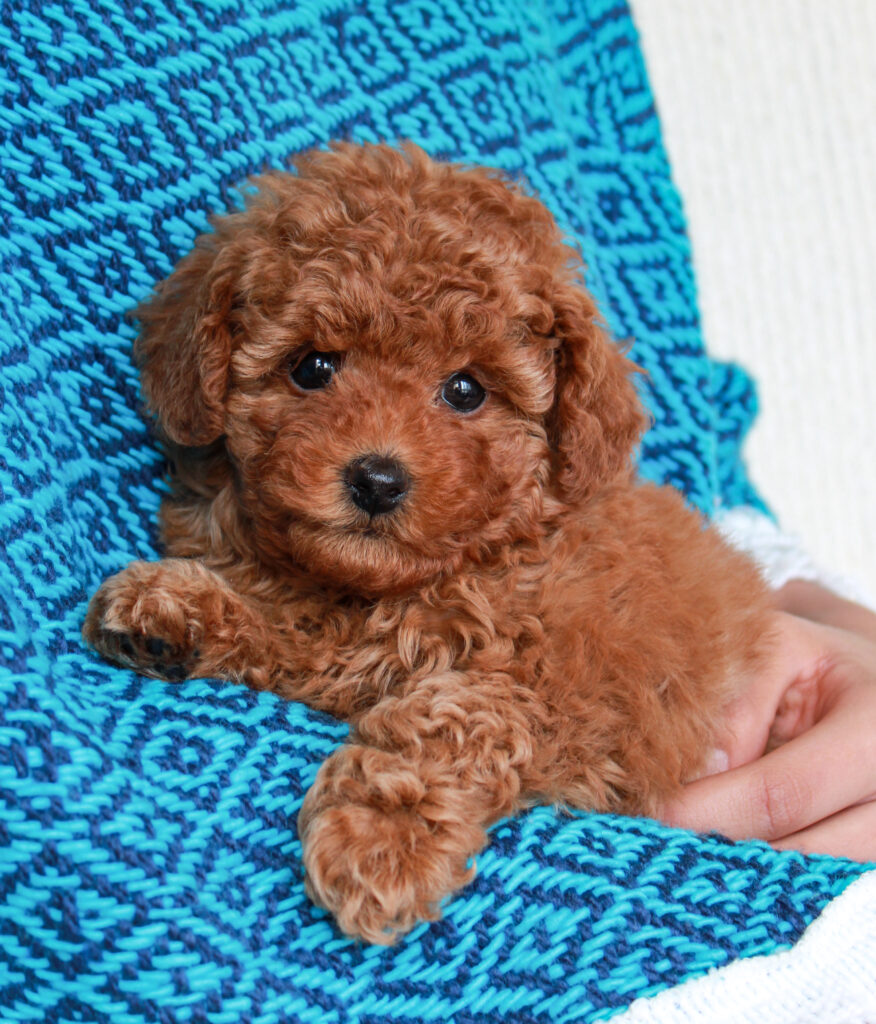
Why Story Tail Dogs Uses ENS and ESI
At Story Tail Dogs, we focus on breeding and raising puppies for therapy and emotional support roles. This means we go beyond basic socialization—we provide intentional early exposure that shapes how our puppies handle the world. ENS and ESI are essential parts of our breeding program because they help us raise well-rounded, confident, and adaptable dogs.
ENS: Building Resilient, Confident Puppies
Every puppy we raise undergoes ENS exercises to strengthen their nervous systems and build resilience. We believe that a puppy’s early experiences shape how they respond to life’s challenges. A therapy or emotional support dog needs to remain calm under pressure, handle new situations gracefully, and recover quickly from stress. ENS helps create that foundation.
Many puppies struggle with vet visits, grooming, car rides, or loud noises. ENS-prepared puppies tend to handle these experiences with greater ease. Their exposure to mild stress in early life helps them regulate their emotions and respond to change with confidence instead of anxiety. This is especially important for dogs placed in therapy settings, where they must remain steady in unpredictable environments.
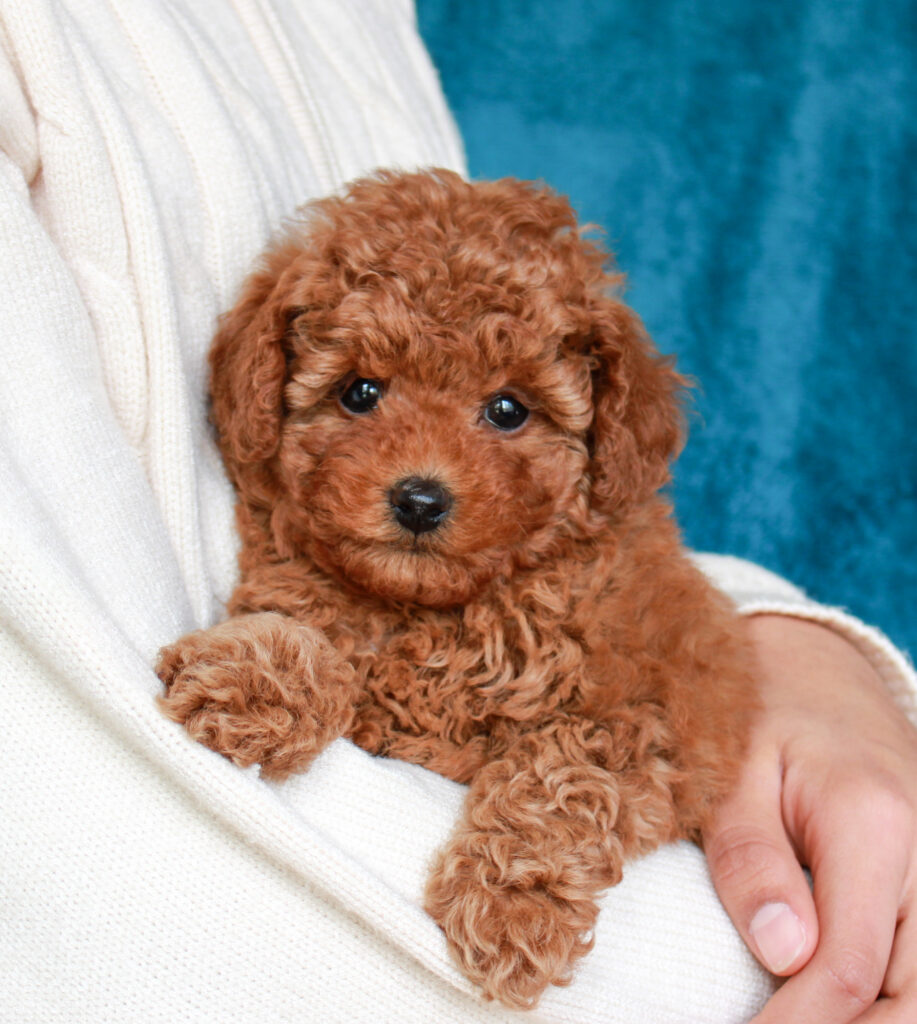
ESI: Strengthening the Skills of Future Therapy and Support Dogs
Scent work is a powerful tool in therapy and emotional support settings. Dogs who recognize and respond to scent cues can provide deeper emotional support, detect changes in human stress levels, and navigate complex environments with ease. That’s why we use ESI to expose our puppies to a variety of scents from an early age.
Our puppies experience new scents daily, helping them build strong associations and adaptability. When they join their new families, they are more likely to adjust quickly to household smells, new places, and unfamiliar objects. This makes transitions smoother and strengthens their ability to bond with their owners.
For therapy dogs, a well-developed sense of smell is an asset. Many therapy and emotional support dogs work with individuals experiencing anxiety, depression, or PTSD. A dog trained in scent recognition can pick up on subtle emotional shifts and respond accordingly. Whether through gentle nudging, laying their head on a person’s lap, or providing physical comfort, these dogs use scent and body language to connect with their owners.

A Commitment to Raising Exceptional Puppies
At Story Tail Dogs, we take pride in raising puppies who are not only loving companions but also capable, resilient, and emotionally intelligent. ENS and ESI are just two of the many ways we ensure our puppies have the best possible start in life. These methods prepare them to handle new experiences, form strong bonds, and thrive in therapy and emotional support roles.
By incorporating ENS and ESI into our program, we set our puppies apart. Our goal is to raise dogs who bring comfort, stability, and companionship to their families and the communities they serve. Whether they become therapy dogs in schools, hospitals, or homes, our puppies are equipped with the skills they need to succeed.
Final Thoughts
ENS and ESI may seem like small exercises, but their impact is profound. The work we do in those first few weeks lays the foundation for a lifetime of success. By building resilience, confidence, and adaptability, we ensure that every Story Tail puppy is ready to become a loyal companion and a steady source of support.
If you’re looking for a therapy or emotional support dog with a strong foundation, Story Tail Dogs is here to help. Our puppies receive the early care and training they need to grow into exceptional companions, ready to add a tail to your story.
If you’re interested in learning more about Poodles and their early development, the American Kennel Club offers a helpful breed overview at: https://www.akc.org/dog-breeds/poodle/. For insights into how puppies grow and change in the first few weeks of life, VCA Animal Hospitals has a great resource on behavior and training here: https://vcahospitals.com/know-your-pet/puppy-behavior-and-training—rearing-the-perfect-puppy. And if you’re curious about early neurological stimulation (ENS) and how it supports healthy development, check out this article from Breeding Better Dogs: https://www.breedingbetterdogs.com/article/early-neurological-stimulation.
Leave a Reply Cancel reply
Storytail Dogs
A Dog For Your Story. Focused on READ dogs, therapy dogs, and resilient family companions.
@storytaildogs
© StorytailDogs 2024. All rights reserved. | Legal |